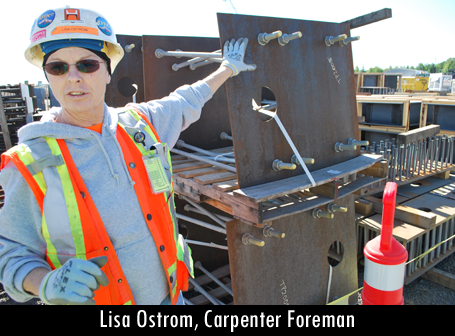Lisa Ostrom: “The girl” becomes the foreman
Back when Lisa Ostrom was growing up in Clark County, Washington, there were no opportunities for the young tomboy to play sports. But there was woodshop. Ostrom took four years of woodworking classes in high school. Small wonder that now she’s a foreman on Hoffman Construction’s Intel project in Beaverton.
Or at least, she was. And she will be again – but for the moment, the 53 year old is dealing with another challenge: ovarian cancer. She was diagnosed this year with stage three tumors after noticing some irregular stomach bloat, and has been plowing through rounds of chemotherapy while she waits to be deemed able to get back on the job.
“I get bored easy at home,” Ostrom tells us, once again outfitted in her hard hat and safety vest on the day that she is interviewed by Oregon Tradeswomen, Inc.
It’s clear that Ostrom’s workmates miss her as much as she misses them. An endless parade of peers come up to give her hugs, ask her about her wellbeing – nothing too technical, just enough to show to even the casual observer that she’s an integral part of the Hoffman team.
But there was a time when a woman working on a building trades site was not that common of a sight. After working at a teen clothing store, doing inventory and purchasing for a bearings company, furniture store, and Custom Aluminum, Ostrom got a job flagging on the Delta Interchange. Her employer, Kiewit, liked her and suggested that she join the Laborers.
“I would have liked to join the Operators,” Ostrom remembers. “But that takes confidence – back then I didn’t have any.” After working with the Laborers for a spell, she joined the Carpenters, never looking back after working on the Bonneville Locks for nine months, and a number of bridges and water treatment plants shortly thereafter.
Back in those days, it was rare to see woman on the job. “I was known as ‘the girl’ for a while, because there wasn’t very many girls at that time,” Ostrom says. But she took it upon herself to find team equilibrium, studying the way her coworkers did their jobs – right down to what they wore. “I just tried to dress like they did,” says Ostrom. “Sweatshirt, Levi’s, I didn’t try to wear makeup.”
At 37 years old, she started working for Hoffman. There, she became a foreman, overseeing the work of others. At first, she tells us, she played it stern. “Some of the guys around here may remember me from back then,” she laughs. But after awhile, the job – and developments in her personal life – taught her that oftentimes success comes with softening up a little.
“You get the job done faster if you can all communicate,” Ostrom reflects. “You have to know when to diffuse certain situations.” She says the company places a premium on positive feedback and supervisors who can keep their cool in high pressure situations.
After our interview, she tells us she’s off to speak with her supervisor about coming back to her job in a way that will mesh with her ongoing chemo sessions.
She drums her neatly manicured nails on the table when we ask her what her advice is for women entering the trades – she’s worked at Oregon Tradeswoman, Inc.’s annual Women in Trades Career Fair for a number of years, so it’s a question that she’s used to answering.
“You gotta listen and learn,” she says. Make sure you really think hard about the profession you’re choosing. “As long as you’re willing to do that, the guys are willing to help you.”
Ostrom should know a thing or two about conquering difficult situations – the responsibility she’s entrusted with on the job serves as proof she’s mastered the skills of her trade. And the challenge of going into a field where women were once rarities can’t be as all consuming as Ostrom’s experiences with chemotherapy – but perhaps the rules have some similarities.
Says the sunny, tough tradeswoman: “The first time you feel like giving up, you feel so sore. But then you go in again, and you see everyone is going through the same thing.”
“I think the trades have made me more outgoing,” she reflects. “I think they can really bring out the best in you.”
